- Home
- Leo Tolstoy
Family Happiness Page 2
Family Happiness Read online
Page 2
"How fond I am of this place of yours!" he said, changing the conversation; "I wish I could spend all my life here, sitting in this veranda."
"Well, do then!" said Katya.
"That's all very well," he said, "but life won't sit still."
"Why don't you marry?" asked Katya; you would make an excellent husband.
"Because I like sitting still?" and he laughed. "No, Katerina Karlovna, too late for you and me to marry. People have long ceased to think of me as a marrying man, and I am even surer of it myself; and I declare I have felt quite comfortable since the matter was settled."
It seemed to me that he said this in an unnaturally persuasive way.
"Nonsense!" said Katya; "a man of thirty-six makes out that he is too old!"
"Too old indeed," he went on, "when all one wants is to sit still. For a man who is going to marry that's not enough. Just you ask her," he added, nodding at me; "people of her age should marry, and you and I can rejoice in their happiness."
The sadness and constraint latent in his voice was not lost upon me. He was silent for a little, and neither Katya nor I spoke.
"Well, just fancy," he went on, turning a little on his seat; "suppose that by some mischance I married a girl of seventeen, Masha, if you like – I mean, Marya Aleksandrovna. The instance is good; I am glad it turned up; there could not be a better instance."
I laughed; but I could not understand why he was glad, or what it was that had turned up.
"Just tell me honestly, with your hand on your heart," he said, turning as if playfully to me, "would it not be a misfortune for you to unite your life with that of an old worn-out man who only wants to sit still, whereas Heaven knows what wishes are fermenting in that heart of yours?"
I felt uncomfortable and was silent, not knowing how to answer him.
"I am not making you a proposal, you know," he said, laughing; "but am I really the kind of husband you dream of when walking alone in the avenue at twilight? It would be a misfortune, would it not?"
"No, not a misfortune," I began.
"But a bad thing," he ended my sentence.
"Perhaps; but I may be mistaken . . ." He interrupted me again.
"There, you see! She is quite right, and I am grateful to her for her frankness, and very glad to have had this conversation. And there is something else to be said" – he added: "for me too it would be a very great misfortune."
"How odd you are! You have not changed in the least," said Katya, and then left the veranda, to order supper to be served.
When she had gone, we were both silent and all was still around us, but for one exception. A nightingale, which had sung last night by fitful snatches, now flooded the garden with a steady stream of song, and was soon answered by another from the dell below, which had not sung till that evening. The nearer bird stopped and seemed to listen for a moment, and then broke out again still louder than before, pouring out his song in piercing long drawn cadences. There was a regal calm in the birds' voices, as they floated through the realm of night which belongs to those birds and not to man. The gardener walked past to his sleeping-quarters in the greenhouse, and the noise of his heavy boots grew fainter and fainter along the path. Someone whistled twice sharply at the foot of the hill; and then all was still again. The rustling of leaves could just be heard; the veranda awning flapped; a faint perfume, floating in the air, came down on the veranda and filled it. I felt silence awkward after what had been said, but what to say I did not know. I looked at him. His eyes, bright in the half-darkness, turned towards me.
"How good life is!" he said.
I sighed, I don't know why.
"Well?" he asked.
"Life is good," I repeated after him.
Again we were silent, and again I felt uncomfortable. I could not help fancying that I had wounded him by agreeing that he was old; and I wished to comfort him but did not know how.
"Well, I must be saying good-bye," he said, rising; "my mother expects me for supper; I have hardly seen her all day."
"I meant to play you the new sonata," I said.
"That must wait," he replied; and I thought that he spoke coldly.
"Good-bye."
I felt still more certain that I had wounded him, and I was sorry. Katya and I went to the steps to see him off and stood for a while in the open, looking along the road where he had disappeared from view. When we ceased to hear the sound of his horse's hoofs, I walked round the house to the veranda, and again sat looking into the garden; and all I wished to see and hear, I still saw and heard for a long time in the dewy mist filled with the sounds of night.
He came a second time, and a third; and the awkwardness arising from that strange conversation passed away entirely, never to return. During that whole summer he came two or three times a week; and I grew so accustomed to his presence, that, when he failed to come for some time, Ii missed him and felt angry with him, and thought he was behaving badly in deserting me. He treated me like a boy whose company he liked, asked me questions, invited the most cordial frankness on my part, gave me advice and encouragement, or sometimes scolded and checked me. But in spite of his constant effort to keep on my level, I was aware that behind the part of him which I could understand there remained an entire region of mystery, into which he did not consider it necessary to admit me; and this fact did much to preserve my respect for him and his attraction for me. I knew from Katya and from our neighbors that he had not only to care for his old mother with whom he lived, and to manage his own estate and our affairs, but was also responsible for some public business which was the source of serious worries; but what view he took of all this, what were his convictions, plans, and hopes, I could not in the least find out from him. Whenever I turned the conversation to his affairs, he frowned in a way peculiar to himself and seemed to imply, "Please stop! That is no business of yours;" and then he changed the subject. This hurt me at first; but I soon grew accustomed to confining our talk to my affairs, and felt this to be quite natural.
There was another thing which displeased me at first and then became pleasant to me. This was his complete indifference and even contempt for my personal appearance. Never by word or look did he imply that I was pretty; on the contrary, he frowned and laughed, whenever the word was applied to me in his presence. He even liked to find fault with my looks and tease me about them. On special days Katya liked to dress me out in fine clothes and to arrange my hair effectively; but my finery met only with mockery from him, which pained kind-hearted Katya and at first disconcerted me. She had made up her mind that he admired me; and she could not understand how a man could help wishing a woman whom he admired to appear to the utmost advantage. But I soon understood what he wanted. He wished to make sure that I had not a trace of affectation. And when I understood this I was really quite free from affectation in the clothes I wore, or the arrangement of my hair, or my movements; but a very obvious form of affectation took its place – an affectation of simplicity, at a time when I could not yet be really simple. That he loved me, I knew; but I did not yet ask myself whether he loved me as a child or as a woman. I valued his love; I felt that he thought me better than all other young women in the world, and I could not help wishing him to go on being deceived about me. Without wishing to deceive him, I did deceive him, and I became better myself while deceiving him. I felt it a better and worthier course to show him to good points of my heart and mind than of my body. My hair, hands, face, ways – all these, whether good or bad, he had appraised at once and knew so well, that I could add nothing to my external appearance except the wish to deceive him. But my mind and heart he did not know, because he loved them, and because they were in the very process of growth and development; and on this point I could and did deceive him. And how easy I felt in his company, once I understood this clearly! My causeless bashfulness and awkward movements completely disappeared. Whether he saw me from in front, or in profile, sitting or standing, with my hair up or my hair down, I felt that he knew me from head
to foot, and I fancied, was satisfied with me as I was. If, contrary to his habit, he had suddenly said to me as other people did, that I had a pretty face, I believe that I should not have liked it at all. But, on the other hand, how light and happy my heart was when, after I had said something, he looked hard at me and said, hiding emotion under a mask of raillery:
"Yes, there is something in you! you are a fine girl – that I must tell you."
And for what did I receive such rewards, which filled my heart with pride and joy? Merely for saying that I felt for old Grigori in his love for his little granddaughter; or because the reading of some poem or novel moved me to tears; or because I liked Mozart better than Schulhof. And I was surprised at my own quickness in guessing what was good and worthy of love, when I certainly did not know then what was good and worthy to be loved. Most of my former tastes and habits did not please him; and a mere look of his, or a twitch of his eyebrow was enough to show that he did not like what I was trying to say; and I felt at once that my own standard was changed. Sometimes, when he was about to give me a piece of advice, I seemed to know before hand what he would say. When he looked in my face and asked me a question, his very look would draw out of me the answer he wanted. All my thoughts and feelings of that time were not really mine: they were his thoughts and feelings, which had suddenly become mine and passed into my life and lighted it up. Quite unconsciously I began to look at everything with different eyes – at Katya and the servants and Sonya and myself and my occupations. Books, which I used to read merely to escape boredom, now became one of the chief pleasures of my life, merely because he brought me the books and we read and discussed them together. The lessons I gave to Sonya had been a burdensome obligation which I forced myself to go through from a sense of duty; but, after he was present at a lesson, it became a joy to me to watch Sonya's progress. It used to seem to me an impossibility to learn a whole piece of music by heart; but now, when I knew that he would hear it and might praise it, I would play a single movement forty times over without stopping, till poor Katya stuffed her ears with cottonwool, while I was still not weary of it. The same old sonatas seemed quite different in the expression, and came out quite changed and much improved. Even Katya, whom I knew and loved like a second self, became different in my eyes. I now understood for the first time that she was not in the least bound to be the mother, friend, and slave that she was to us. Now I appreciated all the self-sacrifice and devotion of this affectionate creature, and all my obligations to her; and I began to love her even better. It was he too who taught me to take quite a new view of our serfs and servants and maids. It is an absurd confession to make – but I had spent seventeen years among these people and yet knew less about than about strangers whom I had never seen; it had never once occurred to me that they had their affections and wishes and sorrows, just as I had. Our garden and woods and fields which I had known so long, became suddenly new and beautiful to me. He was right in saying that the only certain happiness in life is to live for others. At the time his words seemed to me strange, and I did not understand them; but by degrees this became a conviction with me, without thinking about it. He revealed to me a whole new world of joys in the present, without changing anything in my life, without adding anything except himself to each impression in my mind. All that had surrounded me from childhood without saying anything to me, suddenly came to life. The mere sight of him made everything begin to speak and press for admittance to my heart, filling it with happiness.
Often during that summer, when I went upstairs to my room and lay down on my bed, the old unhappiness of spring with its desires and hopes for the future gave place to a passionate happiness in the present. Unable to sleep, I often got up and sat on Katya's bed and told her how perfectly happy I was, though I now realize that this was quite unnecessary, as she could see it for herself.
But when told me that she was quite content and perfectly happy, and kissed me. I believed her – it seemed to me so necessary and just that everyone should be happy. But Katya could think of sleep too; and sometimes, pretending to be angry, she drove me from her bed and went to sleep, while I turned over and over in my mind all that made me so happy. Sometimes I got up and said my prayers over again, praying in my own words and thanking God for all the happiness he had given me.
All was quiet in the room; there was only the even breathing of Katya in her sleep, and the ticking of the clock by her bed, while I turned from side to side and whispered words of prayer, or crossed myself and kissed the cross round my neck. The door was shut and the windows shuttered; perhaps a fly or gnat hung buzzing in the air. I felt a wish never to leave that room – a wish that dawn might never come, that my present frame of mind might never change. I felt that my dreams and thoughts and prayers were live things, living there in the dark with me, hovering about my bed, and standing over me. And every thought was his thought, and every feeling his feeling. I did not know yet that this was love; I though that things might go on so for ever, and that this feeling involved no consequences. Chapter 3
One day when the corn was being carried, I went with Katya and Sonya to our favorite seat in the garden, in the shade of the lime trees and above the dell, beyond which the fields and woods lay open before us. It was three days since Sergey Mikhaylych had been to see us; we were expecting him, all the more because our bailiff reported that he had promised to visit the harvest field. At two o'clock we saw him ride on to the rye field. with a smile and a glance at me, Katya ordered peaches and cherries, of which he was very fond, to be brought; then she lay down on the bench and began to doze. I tore off a crooked flat lime tree branch, which made my hand wet with its juicy leaves and juicy bark. then I fanned Katya with it and went on with my book, breaking off from time to time, to look at the field path along which he must come. Sonya was making a dolls' house at the root of an old lime tree. The day was sultry, windless, and steaming; the clouds were packing and growing blacker; all morning a thunderstorm had been gathering, and I felt restless, as I always did before thunder. But by afternoon the clouds began to part, the sun sailed out into a clear sky, and only in one quarter was there a faint fumbling. A single heavy cloud, lowering above the horizon and mingling with the dust from the fields, was rent from time to time by pale zigzags of lightning which ran down to the ground. It was clear that for today the storm would pass off, with us at all events. The road beyond the garden was visible in places, and we could see a procession of high creaking carts slowly moving along it with their load of sheaves, while the empty carts rattled at a faster pace to meet them, with swaying legs and shirts fluttering in them. The thick dust neither blew away nor settled down – it stood still beyond the fence, and we could see it through the transparent foliage of the garden trees. A little farther off, in the stackyard, the same voices and the same creaking of wheels were audible; and the same yellow sheaves that had moves slowly past the fence were now flying aloft, and I could see the oval stacks gradually rising higher, and their conspicuous pointed tops, and the laborers swarming upon them. On the dusty field in front more carts were moving and more yellow sheaves were visible; and the noise of the carts, with the sound of talking and singing, came to us from a distance. At one side the bare stubble, with strips of fallow covered with wormwood, came more and more into view. Lower down, to the right, the gay dresses of the women were visible, as they bent down and swung their arms to bind the sheaves. Here the bare stubble looked untidy; but the disorder was cleared by degrees, as the pretty sheaves were ranged at close intervals. It seemed as if summer had suddenly turned to autumn before my eyes. The dust and heat were everywhere, except in our favorite nook in the garden; and everywhere, in this heat and dust and under the burning sun, the laborers carried on their heavy task with talk and noise.
Meanwhile Katya slept so sweetly on our shady bench, beneath her white cambric handkerchief, the black juicy cherries glistened so temptingly on the plate, our dresses were so clean and fresh, the water in the jug was so bright with rainbow colo
rs in the sun, and I felt so happy. "How can I help it?" I thought; "am I to blame for being happy? And how can I share my happiness? How and to whom can I surrender all myself and all my happiness?"
By this time the sun had sunk behind the tops of the birch avenue, the dust was settling on the fields, the distance became clearer and brighter in the slanting light. The clouds had dispersed altogether; I could see through the trees the thatch of three new corn stacks. The laborers came down off the stacks; the carts hurried past, evidently for the last time, with a loud noise of shouting; the women, with rakes over their shoulders and straw bands in their belts, walked home past us, singing loudly; and still there was no sign of Sergey Mikhaylych, though I had seen him ride down the hill long ago. Suddenly he appeared upon the avenue, coming from a quarter where I was not looking for him. He had walked round by the dell. He came quickly towards me, with his hat off and radiant with high spirits. Seeing that Katya was asleep, he bit his lip, closed his eyes, and advanced on tiptoe; I saw at once that he was in that peculiar mood of causeless merriment which I always delighted to see in him, and which we called "wild ecstasy". He was just like a schoolboy playing truant; his whole figure, from head to foot, breathed content, happiness, and boyish frolic.
"Well, young violet, how are you? All right?" he said in a whisper, coming up to me and taking my hand. Then, in answer to my question, "Oh, I'm splendid today, I feel like a boy of thirteen – I want to play at horses and climb trees."
"Is it wild ecstasy?" I asked, looking into his laughing eyes, and feeling that the "wild ecstasy" was infecting me.
"Yes," he answered, winking and checking a smile. "But I don't see why you need hit Katerina Karlovna on the nose."
With my eyes on him I had gone on waving the branch, without noticing that I had knocked the handkerchief off Katya's face and was now brushing her with the leaves. I laughed.
"She will say she was awake all the time," I whispered, as if not to awake Katya; but that was not my real reason – it was only that I liked to whisper to him.

 The Death of Ivan Ilych
The Death of Ivan Ilych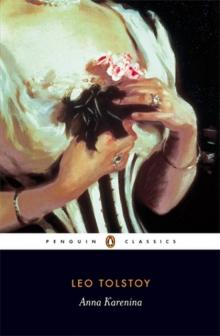 Anna Karenina
Anna Karenina Resurrection
Resurrection Family Happiness
Family Happiness War and Peace
War and Peace The Cossacks
The Cossacks The Kreutzer Sonata
The Kreutzer Sonata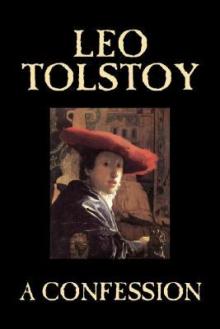 A Confession
A Confession The Kingdom of God Is Within You
The Kingdom of God Is Within You Father Sergius
Father Sergius Childhood, Boyhood, Youth
Childhood, Boyhood, Youth Lives and Deaths
Lives and Deaths The Devil
The Devil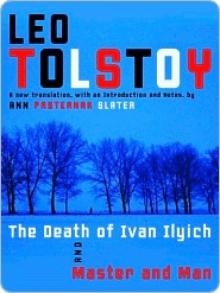 The Death of Ivan Ilyich and Master and Man
The Death of Ivan Ilyich and Master and Man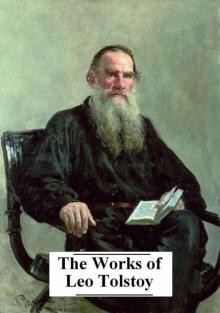 The Complete Works of Leo Tolstoy (25+ Works with active table of contents)
The Complete Works of Leo Tolstoy (25+ Works with active table of contents)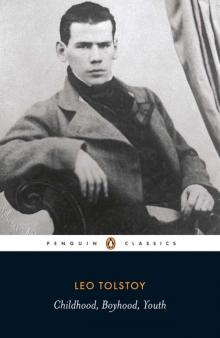 Childhood, Boyhood, Youth (Penguin ed.)
Childhood, Boyhood, Youth (Penguin ed.)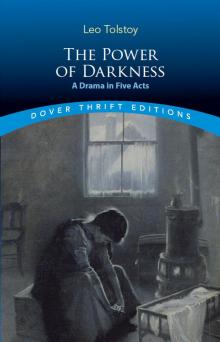 The Power of Darkness
The Power of Darkness Android Karenina
Android Karenina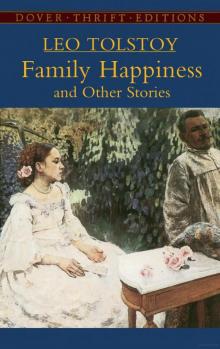 Family Happiness and Other Stories
Family Happiness and Other Stories The Lion and the Puppy
The Lion and the Puppy Collected Shorter Fiction, Volume 2
Collected Shorter Fiction, Volume 2 Collected Shorter Fiction, Volume 1
Collected Shorter Fiction, Volume 1